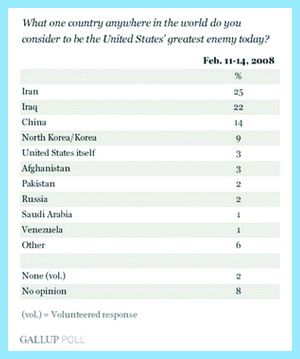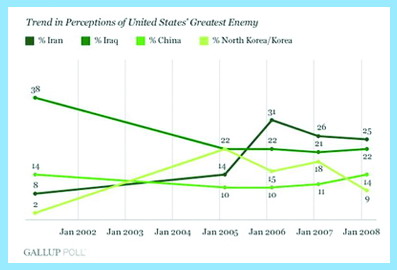A recent poll by the American survey company Gallup suggests that China has replaced North Korea as one of the top three US enemies in the eyes of Americans. Fourteen percent of respondents cited China as the greatest enemy, which placed it at number three below Iran and Iraq. To further explore how individual Chinese and Americans view the survey findings, the EO's Zhang Hong and Nicholas Ray sound off on what could have led to this result.
To further explore how individual Chinese and Americans view the survey findings, the EO's Zhang Hong and Nicholas Ray sound off on what could have led to this result.
Zhang, an experienced Chinese financial journalist, is the vice-chief editor of the EO Chinese edition online.
Ray, an American citizen, works as a media advisor for the EO.
We hope the following frank exchanges can serve as a launch pad for more debate and reflection on Sino-US relations and beyond.
Zhang:
It's surprising that the anti-China sentiment reached that high in the States. Just hope this poll doesn't reflect the real picture, since a survey covering 1007 adults shouldn't be treated seriously enough. But, the question is, why the Americans hate Chinese?
Ray:
Actually, Americans do not "hate" China, nor is there rampant anti-Chinese sentiment there. This was not tested by the March 28 Gallup poll. Instead, the poll hints that Americans are increasingly coming to the conclusion that China is a threat or competitor to the US. Certainly, the media plays a role in this perception. So an important question is, what has the US media been saying about China in the past year that could have contributed to this?
Zhang:
First, "Made in China" products are flushing into the American markets, causing the closures of small and medium enterprises and huge losses of the jobs. Chinese products are low-priced, that's why the normal Americans like to buy them. The low price is based on the relative cheap labor cost in China. That means Chinese workers are contributing to the welfare of the American people. In terms of the enterprises' closures, that's because entrepreneurs are seeking lower costs oversea and shifting their production bases to the countries like China, India and Vietnam.
Second, the "poor-quality, possibly also unsafe" Chinese products are hurting the American consumers benefits. Media revealed last year that a number of Chinese products are unqualified or even dangerous and caused a debate on the credibility of China-made products. But the toy maker Mattel has apologized to China because Chinese manufacturers were not responsible for the toy design which induced the recall. Similar to Mattel, Chinese manufacturers are producing the products according to the American importers' request. So, the importers should be blamed, not the Chinese manufacturers.
Ray:
The Mattel incident was one instance in which a US firm was at fault, but there were many unsafe Chinese products that raised alarm in 2007, and all deserve consideration.
A search of the US Consumer Product Safety site shows just how many recalls involved China-made products. Of course, in some of these cases the US-based companies that contracted out the Chinese manufacturers are to be blamed for poor design. But there are many cases in which the Chinese manufacturers, in order to cut costs, used additives or materials that can be harmful or lethal. And the problem is not limited to Chinese exports; see the fake baby food scare for an example.
In many of these cases, the Chinese government responded swiftly. It executed the head of the top pharmaceutical supervisory organ after it was discovered that he was bribed to approved drugs; it cracked down on manufacturers of fake or tainted products, and even recently established a new organ to investigate product safety in China. The issue was serious and real enough to merit swift and severe responses at all levels of Chinese government.
What does this have to do with China being a danger to the US? Americans see these products, and by extension China, as a threat to their families' health.
Zhang:
Third, China manipulates the Chinese currency exchange rate and causes an expanding trade deficit between the US and China. Actually, the yuan has appreciated over 12 percent since 2005. As a matter of fact, nobody, even the greatest economist can't give a concrete judge on which level the exchange rate is reasonable. China adopts a controlled foreign exchange rate regime and decides to free-float its currency at a gradual pace. That's a natural process that most developing countries will follow. The continuous devaluation of US dollar is a result of the loose monetary policy engineered by the Federal Reserve, which brings the world an increasing inflation and the volatility of the global financial markets.
Fourth, human rights; Fifth, Tibet issue; Sixth, Taiwan issue…. Forget them. Those are political, not what the normal Americans really concern.
Ray:
On the contrary, the fourth, fifth and sixth points that you made probably rank higher than these other more specialized economic issues for most Americans. They are tied to certain core American ideals which are inscribed in the US Constitution and Bill of Rights.
From an early age, Americans are exposed to the impassioned rhetoric of the figures behind the American Revolution. Their speeches are saturated with ideas of self-governance, freedom of speech, democracy, and representation.
And before the American Revolution, one of the earliest seeds of the United States was sewn by a small group of pilgrims who left England in large part to escape restrictions placed on their religious practices. Americans remain spiritual today; in 2001, 81% of Americans identified with a religion. As such, when Americans perceive that a population is being prevented from freely practicing its beliefs, they are reminded of the circumstances in which the US was born, are stirred, and inclined to sympathize.
Americans do not know what it means to build a "harmonious society", nor do they understand the importance of "social stability". But they do know that these are not immediately comparable to American ideals.
If Americans perceive that the principles of Chinese government are not in line with American ones, then it is an enemy in the war of ideas.
Zhang:
Most Americans who I met in China or aboard are friendly to Chinese. Especially for those who are living or working in China, they are very positive on China. China is a wonderful place where new changes are happening and new developments are occurring. They might have complaints on China, about air pollution, about traffic jams or about the low-efficient bureaucracy. These problems are also the headaches of normal Chinese. The only reason these Americans would stay in China is they like this place.
China is becoming more powerful either in terms of economy or military or many other aspects. But that should not be a reason the Americans could treat China as an enemy. A growing-up China will eventually benefit the Americans through more consumption of American goods, more innovation in improving the people's lives and more openness to American people.
In the 18th century, China was described as a "mysterious, rich, civilized and well-organized dreamland" in the Western academies. But as the world turns flat, the mutual trust between the US and China seems to be even more difficult to be achieved. Where does the prejudice come from? The media, or the governments?
Ray:
Why would the US media be interested in portraying China in a more negative light? Perhaps one reason is tied to the media environment in China.
The New York Times, CNN, the BBC, Reuters, AP—all of these news agencies have journalists and branch offices in China, and likewise they must adapt to the media environment here. They are closely monitored, are encouraged not to report on certain issues and are reprimanded by the authorities when they do. Because foreign media are not used to these restrictions, they find China an exceedingly difficult place to conduct journalism in. The interference in their work frustrates them, and reinforces their attitude of reporting on the Chinese government negatively.
More than any one thing, all of the differences between US and Chinese governance, as reflected by the US media, combined with China's ever-increasing economic strength are probably what most contributed to the US perception of China as an enemy. Alone, something different is not necessarily threatening. But something different—and powerful—can easily be interpreted as so.
Interestingly enough, 3% of the poll's respondents said that the US is its own greatest enemy, at a time when foreign perception of the US is sliding and almost two thirds of Americans disapprove of President Bush. Perhaps instead of worrying about who our enemies are, both Chinese and Americans would be better off casting a critical eye inward, stripped of the kind of blind nationalism that pollutes rational thinking about both countries' role in the world.
- Flowers for the CIC | 2008-04-09
- Wenzhou Clansmen Take the Yellow Brick Road Abroad | 2008-04-03
- From China Made to China Consumption | 2008-04-01
- Super Ministries' Success Hinges on Checks and Balances | 2008-03-17
- Participatory Budgets | 2008-03-17











